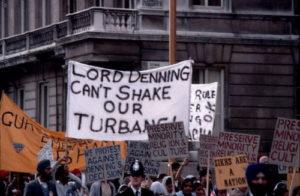Any study of Sikh teachings and Sikh history will show that the Gurus’ teachings differ from other religions in that, while giving advice on responsible living, they also reach out to recognise important commonalities between faiths.
Sikh teachings emphasise ‘sarbat ka bhalla,’ looking to the wellbeing of all members of our one human family. The far-sighted teachings of our Gurus predate, by some four centuries, the Universal Declaration of Human Rights drawn up in the aftermath of the Second World war, as essential for the survival of what the Declaration also terms, our one human family.
Sikhism is a religion that is open to all, not only for personal improvement, but also with a commitment to work for the wellbeing of wider society. It has nothing whatever to do with ethnicity, which by definition refers to transient differences in social and cultural practices.
Why the obsession with ethnicity among some Sikhs?
The Mandla Case
In the early eighties, a Sikh schoolboy was sent home from school on the grounds that wearing a turban was against the school rules. The turban was a religious symbol and under the 1976 Race Relations Act religious discrimination was perfectly legal.
Ethnicity however was a protected characteristic. I advised the then Commission for Racial Equality (CRE) that as most Sikhs then in the UK were born in the Punjab, we had a good chance of winning protection on the grounds of Punjabi ethnic origin. We won protection of Sikh religious identity through the loophole of ethnicity.
Today, the loophole of Punjabi ethnicity would not apply as most Sikhs in the UK were born in the UK. Nor is it necessary because discrimination against religion is now against the law.
Ethnicity and the 2021 Census
Cynically ignoring the Gurus’ teachings on the oneness of our human family, the Sikh Federation UK have spent hundreds of thousands of pounds, promoting themselves as defenders of an exclusive Sikh ethnicity, ignoring the fact that religious belief has nothing to do with ethnic origin. We have asked the SFUK how much exactly was spend and what proportion of these funds were donated by the sangat, but they gave not responded to us. Gurdwaras in places like Wolverhampton and Southampton have been depleted of gurdwara funds.
Sikh responses in the 2021 Census
Sikh responses showed that the UK Sikh community totally rejected SFUK’s attempt to conflate ethnicity with religious identity. 99.7% of Sikhs confirmed their commitment to Sikhism.
Only 0.3% – 1,725 identified with ethnicity alone, rather than with Sikhism, as a faith. Of this group, more than half did not record their religion, 13.6 per cent said they were Muslim, 8.7 per cent Christian, and 12 per cent no religion.
Points from a discussion of Census findings on Punjab Broadcasting Channel (PBC) ‘Think Tank’ chaired by Dr Gurnam Singh – 26th Dec 2023
- Dabinderjit Singh (who likes to pluck figures from the air) – stated the ONS was wrong in recording the UK Sikh population to be some 526,000. It is, he maintained, nearer to 900,000.
- Dr Jasdev Rai acknowledged that the SFUK’s campaign to declare Sikhs an ethnic group had come to a ‘dead end.’ However, his cunning plan was to say that Sikhs are not members of a religion but, a ‘quam’ or ‘dharam’ and, as that these words have no English translation, he maintained, with Baldrick logic, Sikhs should be given a special status.
- Dabinderjit Singh, who supports the SFUK’s claim on Sikh ethnicity with the Mandla case (which was decided in part on the premise that most Sikhs at the time of the ruling were born in Punjab), went on to contradict SFUK’s central argument for separate Sikh ethnicity, by also stating 3/4 of UK Sikhs in the 2021 Census were born in the UK.
- Dr Jasdev Rai, setting aside his own ‘think tank’ credentials, claimed that intellectuals were responsible for all the problems in the Sikh community.
- Dabinderjit Singh when challenged by S Gurnam Singh, said he would be happy to give a full account of the spending (of what is reported to be over one hundred thousand pounds for one judicial review alone[i] – there were three) in campaigning and litigation for a Sikh ethnic tick box. He then went on a peculiar tangent and asked how much the NSO had spent in promoting Punjabi ethnicity.
NSO Comment: The NSO have consistently stated that Sikhism is a world religion open to all and not limited by ethnicity. We have not spent a single penny promoting Punjabi ethnicity.
Given Dabinderjit Singh agreed to disclose the legal costs involved, can the British Sikh community now have the full details of SFUK’s spending in relation to three judicial reviews on their claim that Sikhs are a separate ethnic group?
[i] https://timesofindia.indiatimes.com/world/uk/sikhs-lose-court-battle-to-get-recorded-as-ethnic-group-in-next-uk-census/articleshow/79088035.cms?from=mdr


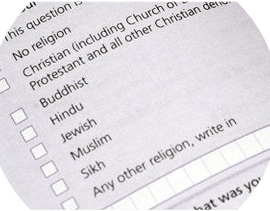
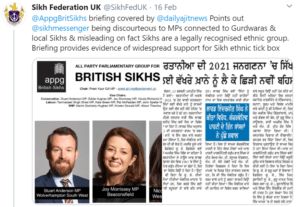 It is no secret our relationship with the Sikh Federation UK (SFUK) has been difficult over the years, especially considering our opposition to their ‘ethnic’ tick box campaign. The SFUK has previously described our Director as ‘an 85-year old dinosaur’,
It is no secret our relationship with the Sikh Federation UK (SFUK) has been difficult over the years, especially considering our opposition to their ‘ethnic’ tick box campaign. The SFUK has previously described our Director as ‘an 85-year old dinosaur’,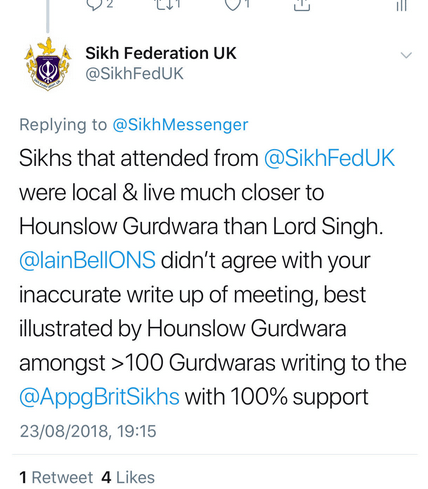
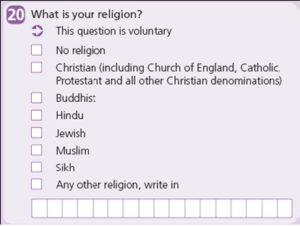 Background: Iain Bell Deputy National Statistician for Population and Public Policy at the Office for National Statistics (ONS) had been invited to the gurdwara over the weekend to discuss concerns felt by the committee over attempts to categorise the Sikh community as an ethnic group. This was as a private meeting to be held with a few members of the committee. An invitation had also been extended to Lord Singh of Wimbledon. As he was not a member of the committee, he first obtained clearance from Iain Bell that it would be OK for him to attend.
Background: Iain Bell Deputy National Statistician for Population and Public Policy at the Office for National Statistics (ONS) had been invited to the gurdwara over the weekend to discuss concerns felt by the committee over attempts to categorise the Sikh community as an ethnic group. This was as a private meeting to be held with a few members of the committee. An invitation had also been extended to Lord Singh of Wimbledon. As he was not a member of the committee, he first obtained clearance from Iain Bell that it would be OK for him to attend.